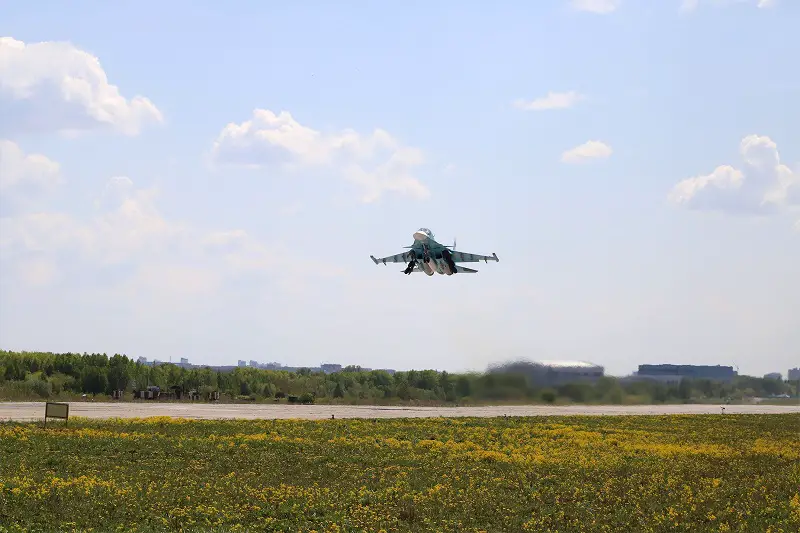Russian aerospace and defense corporation UAC (PJSC United Aircraft Corporation, Obyedinyonnaya Aviastroitelnaya Korporatsiya) reports that it delivered a batch of new-build Sukhoi Su-34s to the Ministry of Defence of the Russian Federation. The first batch of 2023 aircrafts are likely the Su-34M / Su-34 NVO variant. Russian contract was to be signed in 2021 and replace basic Su-34 in production. According to reports, this upgrade will seriously affect almost all of the aircraft’s avionics. The radar, sight, and communication systems will be improved. The range of guided munitions that the bomber can use will be significantly expanded. Electromagnetic warfare (EW) capabilities will also be expanded with introduction of new hardpoints.
The Sukhoi Su-34 (NATO reporting name: Fullback) is a twin-engine, twin-seat, all-weather supersonic medium-range fighter-bomber/strike aircraft. It first flew in 1990, intended for the Soviet Air Forces, and it entered service in 2014 with the Russian Air Force. Based on the Sukhoi Su-27 Flanker air superiority fighter, the Su-34 has an armoured cockpit with side-by-side seating for its two pilots. The Su-34 is designed primarily for tactical deployment against ground and naval targets (tactical bombing/attack/interdiction roles, including against small and mobile targets) on solo and group missions in daytime and at night, under favourable and adverse weather conditions and in a hostile environment with counter-fire and electronic warfare (EW) counter-measures deployed.

The Su-34 is a three lifting surface design having both a conventional horizontal tailplane at the rear and a canard foreplane in front of the main wings. The foreplane provides both additional lift (force) and greater maneuverability. It has twin tail fins like those of Su-27 from which it is derived. The Su-34 has 12 hardpoints for 12,000–14,000 kg (26,000–31,000 lb) of ordnance, intended to include the latest Russian precision-guided weapons. It retains the 30 mm GSh-30-1 cannon of the Su-27 and Su-30, and the ability to carry six R-77 or R-73 air-to-air missiles, with these being primarily for defense against pursuers if detected by the rearward facing radar. The maximum weight of any single munition carried is 4,000 kg (8,800 lb). A Khibiny electronic countermeasures (ECM) system is fitted as standard.
The Su-34 shares most of its wing structure, tail, and engine nacelles with the Su-27/Su-30, with canards like the Su-30MKI, Su-33, and Su-27M/35 to increase static instability (higher manoeuvrability) and to reduce trim drag. The Su-34 is powered by a pair of Saturn AL-31FM1 turbofan engines, the same engines used on the Su-27SM, giving the aircraft a maximum speed of Mach 1.8+ when fully loaded. Although slower than the standard Su-27, the Su-34 can still handle high G-loads and perform aerobatic maneuvers. When equipped with a full weapons load, the Su-34 has a maximum range of 4,000 km (2,500 mi; 2,200 nmi), or further with aerial refueling. The airframe is cleared to perform maneuvers of up to +9 g. The noise level of the Su-34 is two times lower than the level of its predecessors.












